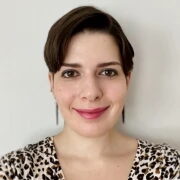Professor Rachel Gregor joined the Department of Chemical Engineering & Applied Chemistry (ChemE) in March 2025. She leads the MicroChemEco Lab, which sits at the intersection of chemistry, microbiology and environmental science. Her research focuses on the vast chemical diversity of microbes and their role in shaping ecosystems and global biogeochemical cycles.
Originally from New York City, Gregor moved to Israel after high school and completed both her undergraduate and graduate degrees at Ben-Gurion University of the Negev. She majored in chemistry with a minor in literature, drawn equally to science and the humanities before ultimately choosing the path of chemistry. She completed her PhD in Professor Michael Meijler’s lab, where she explored chemical signaling in bacterial pathogens.
A pivotal moment in her research journey came during a two-month stint at the University of California San Diego in 2015, where she discovered a fascination with microbiome research and metabolomics. Back at Ben-Gurion, she collaborated on a unique project analyzing gut microbiomes from over 100 zoo animals. For her postdoctoral work, Gregor joined Professor Otto Cordero’s lab at MIT to study marine microbial communities and their role in the ocean’s carbon cycle.
We spoke with Gregor to learn more about her journey and what she’s most excited about in her new role.
What drew you to U of T?
At U of T, I feel like I can have my cake and eat it too — it’s a large, international institution with countless opportunities, but at the same time, I’ve found an incredibly supportive and collaborative community in the department and especially in BioZone. The communal nature of BioZone is truly special, and I’m still learning new things about U of T every day.
How did your interest in microbes take root?
If you love chemistry, you should love microbes — they’re brilliant synthetic chemists! I got drawn into the microbial world during my PhD, and my time at UC San Diego introduced me to marine microbiology. I’ll never forget attending a happy hour at the Scripps Institute of Oceanography — watching researchers come straight out of the ocean in wetsuits as the sun set over the Pacific. I thought, “This is it — this is the kind of scientific life I want.”
What are you hoping to accomplish through your research?
Our lab is trying to understand how the chemical diversity of bacteria influences ecosystems. Using high-throughput metabolomics, we map connections between natural products, microbes and the environment. One of our big-picture goals is to engineer microbial communities for applications in health, sustainability and industry. We’re also aiming to create an ecology-based drug discovery pipeline grounded in microbial interactions.
How does your work fit into the department’s broader research goals?
I see my work building on existing strengths in microbial communities, metabolomics and environmental chemistry. I’m excited to add new angles, especially in marine microbiology and drug discovery, and contribute to our collective goal of a more sustainable future.
What do you hope your work will contribute to global challenges?
I believe microbes hold the key to next-generation sustainable technologies and novel therapeutics. Specifically, I hope to help uncover the chemical drivers of microbially-mediated carbon sequestration in oceans and use ecological principles to guide natural product discovery. There’s so much untapped potential in understanding the chemistry of microbial life.
What’s your teaching philosophy?
I want students to understand how chemistry shapes society and our ecosystem. I’m especially passionate about making biology accessible to non-biologists, and chemistry to non-chemists. The future is interdisciplinary, and that’s how I aim to teach.
How will you bring your research into the classroom?
I’d love to offer undergrads hands-on research experiences. I’m inspired by initiatives like the Tiny Earth Project, which gives students the chance to discover antibiotics from local soil samples. Even if we’re not in the field, there’s a treasure trove of real-world data online — chemical, genomic and otherwise — for students to dive into.
What’s something people might not know about you?
I’ve set a personal goal for my first year in Toronto: to try every vegan restaurant in the city. I’m making progress, but the list is long!





